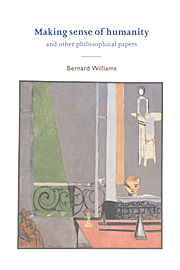Book contents
- Frontmatter
- Contents
- Preface
- I Action, freedom, responsibility
- II Philosophy, evolution, and the human sciences
- III Ethics
- 13 The point of view of the universe: Sidgwick and the ambitions of ethics
- 14 Ethics and the fabric of the world
- 15 What does intuitionism imply?
- 16 Professional morality and its dispositions
- 17 Who needs ethical knowledge?
- 18 Which slopes are slippery?
- 19 Resenting one's own existence
- 20 Must a concern for the environment be centred on human beings?
- 21 Moral luck: a postscript
- Index
15 - What does intuitionism imply?
Published online by Cambridge University Press: 28 January 2010
- Frontmatter
- Contents
- Preface
- I Action, freedom, responsibility
- II Philosophy, evolution, and the human sciences
- III Ethics
- 13 The point of view of the universe: Sidgwick and the ambitions of ethics
- 14 Ethics and the fabric of the world
- 15 What does intuitionism imply?
- 16 Professional morality and its dispositions
- 17 Who needs ethical knowledge?
- 18 Which slopes are slippery?
- 19 Resenting one's own existence
- 20 Must a concern for the environment be centred on human beings?
- 21 Moral luck: a postscript
- Index
Summary
Intuitionism in ethics is nowadays usually treated as a methodological doctrine. In the sense that John Rawls gives to the term in A Theory of justice, an ethical view is intuitionist if it admits a plurality of first principles that may conflict, and, moreover, it has no explicit method or priority rules for resolving such conflicts.
The use of the term to stand for this kind of view represents a change from the practice of the 1950s and 1960s, when it was taken for granted that intuitionism in ethics was an epistemological doctrine, a view about the way in which ethical propositions are grasped or known – the kind of view held, for instance, by W. D. Ross and H. A. Prichard. As such, intuitionism was much criticized at that time, to considerable effect.
It seems to be mainly the influence of Rawls that has brought about this change in the understanding of the term. Interestingly, the change restored an earlier state of affairs. J. O. Urmson tells us that when he was an undergraduate and attended Prichard's classes, it was assumed that intuitionism was to be understood as a methodological position: it was opposed, necessarily, to utilitarianism, and Moore (for instance) was not regarded as an intuitionist.
Rawls seems to regard the epistemological doctrine as an addition to the methodological, and sees intuitionists as a methodological genus of which the notorious epistemological intuitionists are a species. I shall be concerned with the relations between methodological intuitionism (MI), on the one hand, and, on the other, two different epistemological doctrines that may be called ‘intuitionist’ (EI).
- Type
- Chapter
- Information
- Making Sense of HumanityAnd Other Philosophical Papers 1982–1993, pp. 182 - 191Publisher: Cambridge University PressPrint publication year: 1995
- 8
- Cited by



